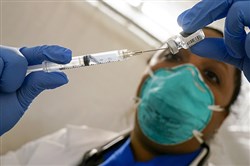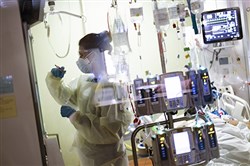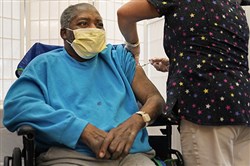VOL. 45 | NO. 42 | Friday, October 15, 2021
Who’s paying for COVID? All of us
By Catherine Mayhew
We are tired. We locked ourselves down in March 2020 and waited almost a year for a lifesaving vaccine. We got our one or two doses (depending on the vaccine brand) as soon as we could. We stayed masked up and social distanced even after our jabs.
For the most part, we did not get sick. Or if we did, it was mild and sometimes non-detectable to us. Most importantly, we stayed out of the hospital.
Almost 70% of us followed the science. That leaves 30% who have not. And the tale is told in the number of hospital beds now occupied by the unvaccinated. A recent Centers for Disease Control study found that unvaccinated people are about 29 times more likely to end up in the hospital with COVID-19 than those who are fully vaccinated.
Hospital intensive care units are clogged with people who could have gotten a free shot instead of costing tens of thousands of dollars on after-the-fact care.
And now the bodies of the unvaccinated are filling up funeral homes and being shuffled off to temporary cold storage when the funeral homes run out of room.
The internet is full of vaccine misinformation that some are all too ready to believe. NewsGuard, a firm that rates the credibility of websites, found that more than 500 of them are promoting lies about the vaccine. And some of them look pretty convincing.
“It’s become virtually impossible for people to tell the difference between a generally reliable site and an untrustworthy site,” Gordon Crovitz, co-founder of NewsGuard, told USA TODAY.
All of this misinformation and mistrust are not just affecting the unvaccinated. The cost in both dollars and psychological trauma are affecting us all. Billions of dollars in unnecessary hospitalizations. Rising insurance rates. A record level of burnout among health care professionals who’ve been on the front lines of this war for almost two years.
If everyone had done their part and gotten vaccinated, medical experts argue, we’d be on the other side of this pandemic. But everyone didn’t.
And we are tired.

The politicalization of COVID-19 vaccinations will impact individual finances for years to come.
-- Photo By Mary Altaffer | Ap“On social media, I’ve been seeing sentiments that I never thought I’d see anyone express in a public forum. People who choose to be unvaccinated should not be offered lung transplants. What if people with COVID-19 who didn’t get the vaccine have to wait in the Emergency Department until everyone else is seen? Should unvaccinated patients just be turned away? These are harsh, angry feelings. And some of the people giving voice to them are doctors.” – New York City Dr. Chavi Karkowsky in The Atlantic.
Without a doubt, the greatest cost of the unvaccinated is to the U.S. health care system.
The Kaiser Family Foundation and the Peterson Center on Healthcare collaborated to estimate health care costs and found that about 287,000 unvaccinated people were hospitalized for the virus between June and August. At an average cost of $20,000 per patient the total amount for hospital stays of the unvaccinated reached $5.7 billion.
“This ballpark figure is likely an understatement of the cost burden from preventable treatment of COVID-19 among unvaccinated adults,” the authors of the study wrote, noting that outpatient costs weren’t added into the total.
Locally, WKRN recently reported that about 90% of the 225 cases then at Vanderbilt were unvaccinated. At Sumner Regional Medical Center, the figure was 93% unvaccinated of 60 patients. At Maury Regional, 95% of the 111 virus patients were unvaccinated.
Dr. Julie Reinhardt, an endocrinologist in private practice in Franklin, hopes numbers like these will wake up the unvaccinated to seek the shots.
“The hospitals are full of unvaccinated patients, not vaccinated patients,” she says. “So don’t get wrapped up in ‘vaccines are risky.’ If there were a problem with vaccines, that’s what we would be seeing. And it’s quite the opposite.”
Reinhardt told her patients in April that, as of Sept. 1, she would no longer see them if they weren’t vaccinated and that she would help them transition to another physician who didn’t have that requirement.
But she wanted to make sure she had one-on-one conversations with her patients about getting vaccinated.
“I don’t have to take the time to dispel misinformation,” she explains. “I choose to. They were getting mixed messages and once they had a conversation with a medical professional, they decided to get vaccinated. It’s personally been super important to me that I’m taking the time to have these conversations. My primary goal is to persuade people to change their minds if they were anti-COVID vaccine. My focus is to get through this pandemic safely.”
Refusing to mask
Next to refusing a vaccination, the other cost comes from the unmasked.

“My compassion wears thin for people who simply choose not to be vaccinated,” says Nashville’s Elizabeth Power, founder of the Trauma Informed Academy and CEO of EPower & Associates,
-- Photo By Kyle Green | ApThe evidence of mask wearing as an effective strategy to reduce infection has increased during the pandemic, the Journal of American Medicine reports, not only as a way to prevent spread from infected people but also as protection to reduce exposure to those wearing masks.
And one of the clearest ways to demonstrate the effectiveness of wearing masks – or not – is in our schools. Children, once thought to be somewhat immune to the coronavirus, are increasingly being exposed as school transitions from remote to in person.
In Tennessee, it’s the Wild West of mask mandates or lack thereof, with the governor telling parents they could opt out of masks for their children. Some systems rebelled and required masks.
Metro Nashville has sent almost 2,000 children and staff home to isolate or quarantine, despite a mask mandate. Other counties, like Wilson, have had to temporarily halt in-person instruction. The costs of that in lost learning and lost wages from parents having to stay home with children are unknown.
Katie Faulkner, a nurse in Franklin, is living through the cost of that personally. Her 10-year-old granddaughter, too young to receive the vaccine, has COVID-19.
“She has been wearing a mask every day and doing all she can to stay healthy,” Faulkner says. “She is now COVID positive and in the second week of feeling horrible. No taste, no sense of smell, terrible body aches and overwhelming fatigue.
“It infuriates me that she is among the few masked children at her school and the majority of her teachers do not wear masks, and I question their vaccination status. The principal of her school was at the first Franklin Special School board meeting on the mask debate and he made a big deal of not having a mask on. Why is the vaccination and masks even a choice when it comes to protecting our children and anyone for that purpose?”

Psychiatrists are warning of COVID-related trauma that will likely emerge in the next decade.
-- Photo By Seth Wenig | Ap“Now that the initial wave of the pandemic is past and insurers are no longer waiving treatment costs, this is absolutely a conversation that’s being had. The exposure for a company that has 90% of employees vaccinated is significantly less than for one closer to the 50% national average.” – Michael Giusti, a health insurance analyst at InsuranceQuotes.com.
Until now, anyone incurring the costs of a hospital stay because of coronavirus has gotten pretty much of a reduced-price pass. Only a small part of the bill has been paid by the patient – about $1,300, the Kaiser Family Foundation reports. The rest is paid by insurance.
That is about to end.
As of November 2020, almost 90% of those suffering from COVID who were hospitalized would have had their out-of-pocket costs waived. Now, CBS News reports, more than 70% of the biggest insurance companies are not waiving those costs, and another 10% will soon end cost-sharing.
“Whenever there’s a big change in any area where our actuaries have to crunch numbers, it’s going to show up,” says Michael Davis, a State Farm insurance agent who runs his own office in Nashville. “They know unvaccinated people are increasing their chances of getting COVID, which increases costs in caring for them.”
Davis says 2020 auto insurance rates went down because people were driving less. When more cars were back on the road, the rates rose again.
And he predicts that soon there will be a question on insurance policy applications about whether a person is vaccinated or not.
“They look at the different causes,” he points out. “They look at male/female, whether the person smokes or doesn’t. Not having the vaccination makes a difference. I haven’t seen it in writing, but insurance companies won’t lose money for too long. It will be on future applications. It’s coming. There’s no doubt.”
Some major employers are hitting their workforce where it hurts the most – in the pocketbook. Delta Airlines is requiring unvaccinated employees to pay $200 more in monthly health insurance. Citigroup is mandating that all of its employees get vaccinated before returning to the office. And the hospitality chain MGM Resorts International is requiring all workers at its Las Vegas properties who are unvaccinated to get regular COVID tests and personally pay for them.
But while employers are losing patience with the unvaccinated, they are also engaged in a delicate dance with labor shortages threatening the bottom line. While many companies can and have mandated vaccines for their salaried workers, they’re reluctant to impose restrictions on hourly employees.
Amazon and Walmart, the nation’s two biggest private employers, haven’t forced vaccinations on hourly workers. And the Kaiser Family Foundation found that 50% of unvaccinated hourly workers would leave their jobs if required to get the shot.
“If you run a restaurant or a store and you have employees who are vaccine-hesitant, they are going to quit and go to the store or restaurant next door,” says Brian Kropp, the chief of research at consulting company Gartner’s HR. “It’s a whole lot easier for people to switch jobs, particularly in today’s labor market.”
In Nashville, most medical entities are requiring vaccination of its employees. That includes Meharry Medical College, Vanderbilt University Medical Center and Ascension St. Thomas. Vanderbilt also required all students to be vaccinated.
Among the businesses requiring a vaccination or negative test of its patrons are City Winery, Exit/In and Bridgestone Arena.
“I am beyond compassion fatigue. I am sick and tired of the selfishness and conspiracy theory driven behavior on the behalf of the anti-vaccine crowd. As for 25%, there is a much higher percentage of unvaccinated people in this state.” – Rick Murray, Hendersonville photographer
A cost of the unvaccinated that’s impossible to assess is the trauma associated with the pandemic. Some call it compassion fatigue. Psychiatrists predict the population at large will suffer some kind of COVID-related trauma over the next decade.
Those who may be experiencing it the most can’t or won’t talk about it – medical personnel. Dr. Chavi Karkowsky, an obstetrician in New York City, did talk about it though in a column for The Atlantic.
She points out that pre-vaccine doctors, nurses and staff worked relentlessly against an enemy with no known antidote.
Now, there’s a vaccine and “the suffering seems different, because it is avoidable. Optional. A choice.
“When people make their personal decision about whether to get vaccinated, they are not thinking about the trauma their health care providers have experienced since early last year,” she writes. “And I am not asking them to consider it.
“Professionalism mandates that physicians focus on the disease in front of them, not the behavior that may have contributed to it … However, the population-level rejection of COVID-19 vaccines is a different phenomenon – and one that’s much more personally threatening to my colleagues and me. By refusing the most effective intervention, people are risking not only their own life but the lives of many around them.”
The health care jobs marketplace Vivian found that 43% of nurses are thinking about leaving the profession this year and 48% of those who work in Intensive Care Units are considering the same.
Elizabeth Power of Nashville deals with trauma every day as the founder of the Trauma Informed Academy and CEO of EPower & Associates, which educates people and companies about trauma response and transformational leadership. She understands the long-lasting trauma that may result from the pandemic.
“My compassion wears thin for people who simply choose not to be vaccinated,” she says. “I realize I don’t know all there is to know about this vaccine, 25 years in the making as a successor to SARS, MERS and other ills in the COVID family, and about levels of natural immunity after having COVID, and how long they last or who has more. I do know that smallpox, measles, polio and diphtheria are all but gone because of vaccinations.
“Moreover, I know that medical care providers are burned to a crisp emotionally, mentally and physically trying to care for people – mostly the unvaccinated – who require intensive care.
“They are pummeled by moral injury at making decisions and experiencing things with COVID patients that are rightfully the family’s choice and experience to have. They have terrifying levels of vicarious trauma and compassion fatigue.”